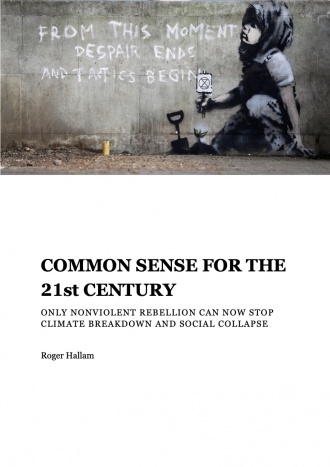This is the last article you can read this month
You can read more article this month
You can read more articles this month
Sorry your limit is up for this month
Reset on:
Please help support the Morning Star by subscribing here
Common Sense for the 21st Century: Only Non-Violent Rebellion Can Now Stop Climate Breakdown and Social Collapse
by Roger Hallam
(rogerhallam.com, free download)
THIS short book by climate activist Roger Hallam highlights the urgency of the crisis the planet is facing and proposes a bold blueprint for addressing it.

Pointing to the dramatic failures of the environmental movement over the past three decades in terms of practical results, Hallam demands a paradigm shift “from words to radical action, from lobbying to mass breaking of the law through non-violent civil disobedience and from elitist exclusion to popular democratic mobilisation.”
His plan is, essentially, for a few thousand committed people to stage a series of non-violent mass actions which trigger a government collapse.
Extinction Rebellion and its allies will then convoke a citizens’ assembly, the first and key task of which will be to take resolute, decisive and science-based action to prevent climate breakdown.
The book is at its best when opening readers’ eyes to the scale of the problem humanity is facing. Hallam’s writing is appropriately urgent and persuasive: “Let’s be frank about what ‘catastrophe’ actually means in this context. We are looking here at the slow and agonising suffering and death of billions of people.”
However, the plan for fixing the crisis betrays a fundamental misunderstanding on the question of political power, vested interests and the relationship between capitalism and its “best possible political shell,” parliamentary democracy.
Forcing a governmental collapse and instituting a citizens’ assembly necessitates overthrowing the state, which means putting an end to the political power of the capitalist class — in summary, a revolution.
The revolutionary transformation of society is an entirely laudable objective. But history indicates quite insistently that revolutionary strategy is a touch more complex and difficult than having a festive sit-down protest.
The capitalist class tends not to react terribly well to attempts to end, or even constrain, its power and it has a very effective tool at its disposal in the form of the state — the army, the police, the judiciary, the intelligence agencies and the bureaucracy, backed up by the organs of “soft power,” the media and the education system.
Examples of how the British state responds to threats to its power can be found in the Jallianwala Bagh massacre of 1919, the Bloody Sunday massacre of 1972, the brutal police treatment of the 1984-85 miners’ strike or, indeed, in the draconian crackdown on the London youth uprising of 2011.
If Extinction Rebellion were to become an existential threat to British capitalism, it too would be subjected to ruthless and bloody suppression. One clear indication of that is the recent decision by police to include Extinction Rebellion on its list of extreme ideologies.
As an example of successful regime-changing civil disobedience, Hallam cites the series of demonstrations in Leipzig, East Germany in 1989, where “the regime was caught off guard by the non-linear increase in the numbers taking part in the demonstrations and the slow, centralised, top-down decision-making structure failed to act in time.”
This snapshot ignores the fact that the anti-government protests in the GDR were part of a movement towards the global capitalist status quo rather than away from it and, as such, it had significant logistical and propaganda support from the most powerful political forces on the planet.
Hallam is indisputably correct that time is running out and that drastic action is required to avert climate catastrophe.
Extinction Rebellion has been highly effective in raising awareness on this issue. But we’re not going to find a magic wand to overthrow capitalism in the next few years and so we need to seriously consider how those of us in the capitalist world can leverage existing political structures, along with mass pressure, to force through a global green new deal.
We should highlight the example of the People’s Republic of China, which is making a dramatic push to reduce greenhouse gas emissions and promote new energy.









